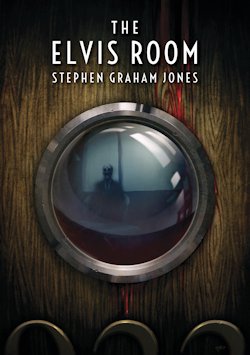Welcome back to the Short Fiction Spotlight, a weekly column dedicated to doing exactly what it says in the header: shining a light on the some of the best and most relevant fiction of the aforementioned form.
The sixth in a series of darkly fantastic chapbooks bearing the This Is Horror hallmark, ‘The Elvis Room’ by Stephen Graham Jones is an unsettling exploration of the science of the supernatural.
At the outset, its unnamed narrator is a respectable gentleman in charge of a sleep lab, but all that changes over the course of the first few pages, when things go from bad to worse with respect to the young woman he’s working with. She suffers from nyctophobia—fear of the dark—which seems to me to be a perfectly reasonable fear.
After all, human eyes haven’t evolved to penetrate the darkness of the savannah night—or the closet, with the light off—and where we can’t see, there our imaginations can populate and propagate. The unseen terrorises specifically by remaining unseen; it’s an axiom for a reason.
What Mary can’t see but is nevertheless convinced exists is the restless spirit of her sister—a particularly painful manifestation of an anxiety felt by many—and her suffering inspires our scientist to go above and beyond. “To prove to her that her fears were baseless,” he borrows the apparatus of a friend in the dark matter department and has Mary spend the night in a hermetically sealed chamber. If he expects to discover nothing he’s got another thing coming.
Not at the height of Mary’s panic attack but right after, something in that darkness of the chamber did in fact move, or seem to.
The atmospheric pressure dilated ever so slightly, as if, perhaps, a hummingbird had opened its mouth, emitted a single, invisible breath.
And the weight shifted in tandem with that.
“Once the papers got their hooks into it, my experiment was of course proof of ghosts,” he notes. Intense interest ensues, and though the media has had its fill of his findings in a matter of months, by then he’s been discredited, his abundance of funding has disappeared into the ether, and—to twist the knife a touch tighter—his personal life has gone to pot. All he has to hold onto are occasional paid appointments to speak at conspiracy cons, where he explains his experiment between panels picking apart the Bigfoot myth and other such silliness.
Sixteen years pass in this fashion, with our narrator a nomad going from hotel to hotel across the country whilst he waits to figure out the fulcrum of his future. He finds it, finally, whilst negotiating a better rate for his latest stay: in the industry, there is a practice, apparently, of saving a single room “in case a president or rock star happens to land unannounced at the front desk.”
He dubs this the Elvis Room, and determines that it seems to be more than simple superstition:
So long as one room was left unoccupied, then guests by and large woke up, made it to breakfast. Those instances where a boisterous guest—an Elvis or a president, yes […]—insisted upon registering for that last room though, well. Nearly without fail, a guest would suffer a stroke or a heart attack in the night, or worse.
There’s a lot to ‘The Elvis Room’; a lot of plot and no paucity of premise. But take heart in the fact that the payoff is as satisfying as the setup is substantial. In large part this is thanks to Jones’ restrained narrator: a man of science drawn into something seemingly supernatural, he does not believe because he wants to believe—on the contrary, he wishes things were different—but rather because he has faith in his discipline, and to reject the results of his studies would be to discard his most imperative principles.
His eventual acknowledgement, then, that there are others among us, packs a powerful punch, as a weight of nervous expectation is lifted in this instant. Furthermore, it marks a significant moment in the story, because belief, our protagonist posits, may well be what makes the unreal real—especially in “sites where we’ve been socially conditioned not to engage […] sites where you don’t question the personhood of that other body in the elevator car, but instead just stare straight ahead,” absently denying the spectral presence of the dead.
Sites like hotels, say…
To wit, the setting of ‘The Elvis Room’ is excellent as well, exposing as it does the undeniably dangerous nature of sleeping in strange places; the uncanny cost of the convenience of a bed and a place to lay your head in the byzantine buildings we share with strangers. I can already tell that I’ll have a tough time feeling at ease in hotels hereafter. See, “there’s a reason that other guest pacing you, three steps ahead, is so silent. It’s that, under his hat, he has no eyes.”
If staying in such places in a fact of life for you, maybe don’t read this story.
If you’re a homebody, however, ‘The Elvis Room’ by Stephen Graham Jones comes very highly recommended. The premium printed publication is already sold out, sadly, but the digital edition is due to be made available any day.
Niall Alexander is an extra-curricular English teacher who reads and writes about all things weird and wonderful for The Speculative Scotsman, Strange Horizons, and Tor.com. He’s been known to tweet, twoo.










